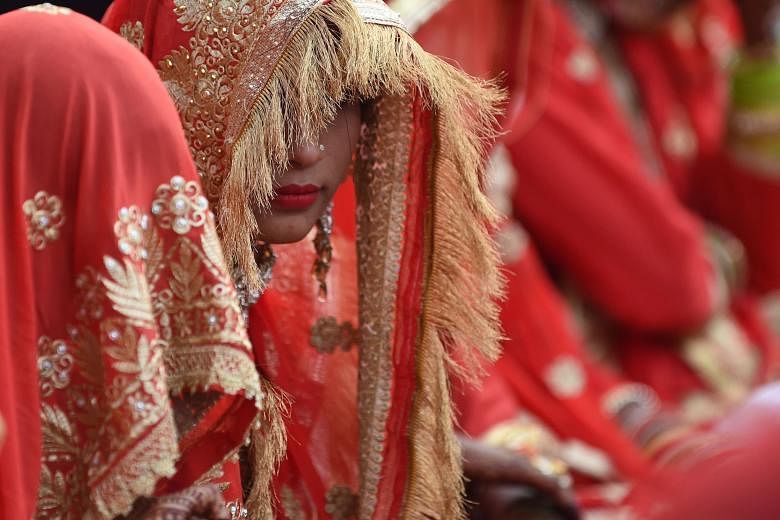Blood flowed on the streets of New Delhi during the February riots, as Hindus and Muslims attacked each other. A young interfaith couple in the city witnessed the events unfold with horror. But this explosion of violence did not weaken their resolve to marry each other.
Ms Nida Rehman, a 26-year-old Muslim, and Mr Mohan Lal, a 28-year-old Hindu, had decided to get married after they met and fell in love in 2011 while they were university students.
Ms Rehman still considers their marriage as a "blooming flower" that could soothe relations between the two communities.
"The child that will come into our house will become familiar with both Hinduism and Islam and grow to respect both religions," she told The Sunday Times.
But India, polarised along religious lines, has been a hostile flowerbed for such interfaith unions that attract censure, not just from the lovers' families, but also society at large.
Ms Rehman walked out of her parent's house in August - they wanted Mr Lal to convert to Islam - and moved into a flat that the young couple rented. She did so after spending a few days under the protection of Dhanak of Humanity, a not-for-profit organisation that counsels interfaith as well as inter-caste couples and offers them temporary refuge.
The couple has taken the battle to the Delhi High Court, seeking to overhaul a law they believe discriminates against interfaith couples.
On Sept 21, they filed a petition against the 1954 Special Marriage Act (SMA), which requires an interfaith couple seeking to marry to issue a notice to a local government "marriage officer" in a district where at least one of them has lived for 30 days or more prior to issuing their notice. This notice must contain private details such as names, addresses and photographs of the couple and has to be displayed in a "conspicuous place" in the marriage officer's office.
This is done so that anybody - not just family or relatives - who wishes to object to the marriage can do so.
Any objection is then inquired into by the officer and the marriage is not solemnised until he is satisfied that the objection lacks merit or unless it is withdrawn. Couples who share the same faith but want to have a secular marriage under the SMA must also follow the same process.
Ms Rehman believes interfaith couples face a greater risk of harassment from uncooperative government officials and strangers after their private details are made public through such notices, especially by those who wish to exploit these relationships for political gains.
Her petition calls for Sections 6 and 7 of the SMA, which lay out this process of inviting public objections, to be scrapped. It claims these sections violate an individual's fundamental rights, including the right to privacy.
Ms Rehman applied last month to the local marriage officer to marry under the SMA, but is still waiting to hear when her 30-day notice period to register her marriage starts.
Interfaith couples have often been victims of harassment across India, even leading to "honour killings" and suicide in many cases.
A 23-year-old Hindu man was murdered not far from his house in Delhi in 2018 by the family of the Muslim girl she was dating.
In cases where the woman is a Hindu and the man a Muslim, accusations of "love jihad" further aggravate communal tension. The term is used by radical Hindu groups to accuse Muslim men of participating in a planned conspiracy to convert Hindu women to Islam by seducing them.
But the SMA lays down specific grounds for objection.
Neither party to a proposed marriage should have a living spouse nor should they suffer from any "unsoundness of mind" that renders them incapable of giving valid consent. They should also not suffer from a "mental disorder" that makes them unfit for marriage or "procreation of children".
There have been growing calls for SMA reform in recent years. In 2018, the Law Commission of India recommended that the 30-day period be reduced to "bring the procedure in line" with Hindu and Muslim marriage laws that enable couples to register their marriage in a day. Between January and September last year in New Delhi, 461 marriages were registered under the SMA, compared with 13,572 under the Hindu Marriage Act.
Mr Asif Iqbal, who co-founded Dhanak of Humanity in 2005, said that the harassment and procedural delays that interfaith couples have to suffer through in order to marry under the SMA force many among them to convert to their partner's faith.
This expedites the marriage and makes it easier under Hindu or Islamic marriage laws. Such an outcome also helps them avoid family pressure or harassment from local police - something which couples living together face at times.
But Ms Rehman and Mr Lal refuse to compromise in such a manner. "We have been clear right from the start of our relationship that we will not convert. We are what we are, we chose each other for what we are. Why change that?" she said.


